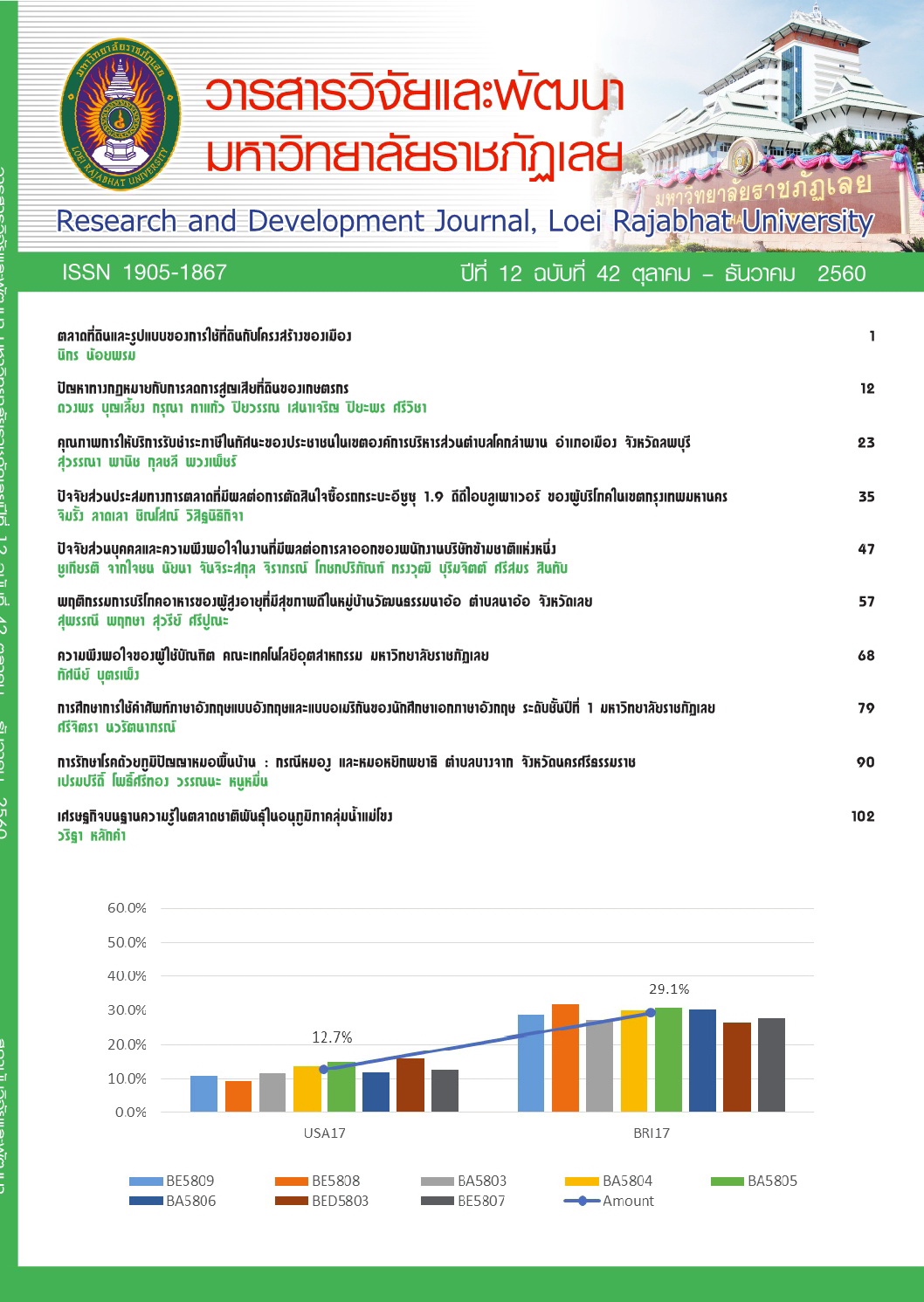เศรษฐกิจบนฐานความรู้ในตลาดชาติพันธุ์ในอนุภูมิภาคลุ่มน้ำแม่โขง
Keywords:
ชาติพันธุ์, ตลาดชาติพันธุ์, เศรษฐกิจ, องค์ความรู้, ethnic, ethnic markets, economy, knowledgeAbstract
บทคัดย่อ
การศึกษาเศรษฐกิจบนฐานความรู้ในตลาดชาติพันธุ์ในอนุภูมิภาคลุ่มน้ำแม่โขง เป็นการศึกษาเชิงคุณภาพ มีวัตถุประสงค์เพื่อศึกษาบริบทของเศรษฐกิจและองค์ความรู้ในตลาดชาติพันธุ์ในอนุภูมิภาคลุ่มน้ำแม่โขง การศึกษาครั้งนี้ เก็บข้อมูลโดยวิธีการสังเกตอย่างมีส่วนร่วมและสัมภาษณ์เชิงลึกในกลุ่มผู้ขายชาติพันธุ์ไทยเขมร ผู้ซื้อ ผู้รับจ้าง และผู้ที่เกี่ยวข้องในตลาดหอนาฬิกา จังหวัดสุรินทร์ จำนวน 15 คน วิเคราะห์ข้อมูลจากบริบทเศรษฐกิจและการจำแนกประเด็น 6 ประเด็น คือ ด้านการผลิต ทุน แรงงาน การขนส่ง การแจกจำหน่ายและนิเวศวิทยาที่เกี่ยวข้อง ใช้เทคนิคการศึกษาข้อมูลเชิงปรากฏการณ์วิทยา
ผลการศึกษา บริบทของเศรษฐกิจในตลาดชาติพันธุ์ในอนุภูมิภาคลุ่มน้ำแม่โขงพื้นที่ตลาดหอนาฬิกา อำเภอเมือง จังหวัดสุรินทร์ พบว่าบริบทเศรษฐกิจในตลาดชาติพันธุ์มีความสัมพันธ์ต่อประเพณี วัฒนธรรม และความเชื่อทางศาสนาเป็นการหมุนเวียนเศรษฐกิจของกลุ่มชาติพันธุ์ไทยเขมร ที่ปฏิบัติสืบทอดกันมาในท้องถิ่นตั้งแต่โบราณ ซึ่งจะเป็นกิจกรรมต่างๆ ที่คนในชุมชนจัดขึ้นประจำปี เป็นภูมิรู้และพลวัตให้เศรษฐกิจหมุนเวียนจึงสืบทอดกันมาจนกลายเป็นการอนุรักษ์และพัฒนาล่วงมาถึงรุ่นลูกหลานในปัจจุบันและยังคงสืบสานปฏิบัติรุ่นสู่รุ่นสืบมา
องค์ความรู้ในตลาดชาติพันธุ์ในอนุภูมิภาคลุ่มน้ำแม่โขงพื้นที่ตลาดหอนาฬิกา จังหวัดสุรินทร์ พบองค์ความรู้ 6 ประเด็น คือ 1) การผลิตสินค้านั้นเป็นสินค้าที่ได้จากป่าธรรมชาติ สินค้าพืชผักปลูกเอง สินค้ารับฝากจากญาติหรือเพื่อนบ้านในชุมชนและสินค้าที่อยู่ในระบบทุนนิยม 2) ทุน ที่ดินสาธารณะประโยชน์และส่วนบุคคล แหล่งน้ำ ปุ๋ยมูลสัตว์ ค่าเช่าพื้นที่และค่าเชื้อเพลิง 3) แรงงานของคนในครอบครัวมีการแบ่งหน้าที่รับผิดชอบตามลักษณะงาน 4) การขนส่งลำเลียงโดยรถยนต์ส่วนบุคคลอาศัยมาร่วมกันของผู้ขายในชุมชนเดียวกัน รถยนต์โดยสารสาธารณะและรถจักรยานยนต์ส่วนบุคคล 5) การแจกจำหน่ายการตั้งราคาไม่ได้กำหนดไว้ตายตัว มีการขายปลีก ขายเหมา ขายแบบเลลัง ยืดหยุ่นตามเหตุการณ์ที่เหมาะสม และ 6) นิเวศที่เกี่ยวข้อง คือปัจจัยแวดล้อมอื่นที่ทำให้ผู้ขายปรับตัวเมื่อมาอยู่ในตลาดชาติพันธุ์เพื่อการดำรงอยู่ได้ตามสภาวะสิ่งแวดล้อม
Abstract
The objective of this qualitative research was to study contexts and bodies of knowledge related to economy of ethnic markets in the Greater Mekong Sub-region. Data had been collected through participatory observations and in-depth interviews with 15 of Thai-Khmer sellers, buyers, employees, and concerning people at Hor-Na-Li-Ka market in Surin province. The collected data had been analyzed basing on economic contexts. The 6 topics including production, capital, labor, transportation, distribution, and related ecology are discussed using a phenomenological research technique.
The study found that, in term of economic contexts of ethnic market in the Greater Mekong Sub-region, the economic context of ethnic market at Hor-Na-Li-Ka market in Surin province is related to cultures, traditions, and Buddhist beliefs. It is the economic circular flow of the Thai-Khmer ethnic people which inherited since the past time through annual activities of communities. It is considered as the knowledge and dynamic that helps to develop and conserve the ethnic economy; thus, the ethnic economy is inherited until nowadays.
According to bodies of knowledge related to ethnic market, there are 6 bodies of knowledge found at Hor-Na-Li-Ka market. 1) Goods found at Hor-Na-Li-Ka market are from the nature, growing vegetables, deposit goods from relatives or neighbors in community, and goods in the capitalism. 2) Capitals are lands for public benefits, personal lands, water resources, manure, rents, and fuel costs. 3) Labors are from a family where each person is assigned depending on types of work. 4) Goods are transported by a personal car where people within a community going together, a public car, and a personal motorcycle. 5) Prices of goods are not fixed. Patterns of selling consist of retailing, wholesaling, and reduced selling which are depend on a situation. 6) Related ecology is other surrounding factors that make sellers at Hor-Na-Li-Ka market to adjust themselves to survive according to a changing environment.
Downloads
Published
How to Cite
Issue
Section
License
ข้อความที่ปรากฎในวารสารฉบับนี้เป็นความคิดเห็นของผู้เขียนแต่ละท่าน สถาบันวิจัยและพัฒนา มหาวิทยาลัยราชภัฏเลย และกองบรรณาธิการ ไม่จำเป็นต้องเห็นด้วยและไม่มีส่วนรับผิดชอบใดๆ
สถาบันวิจัยและพัฒนา มหาวิทยาลัยราชภัฏเลย ขอให้ผู้อ่านอ้างอิงในกรณีที่ท่านคัดลอกเนื้อหาบทความในวารสารฉบับนี้






